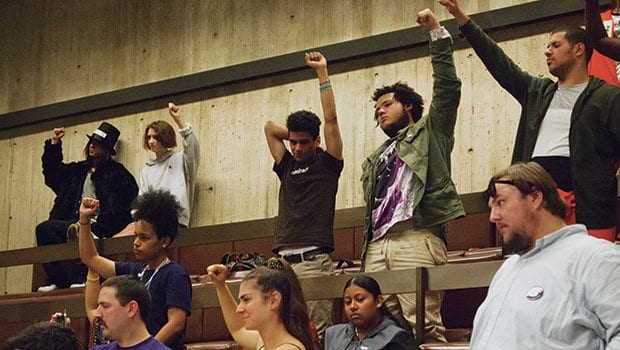
Echoes of last year’s thousands-strong walkouts protesting budget decreases seemed to hang in City Hall last Thursday, as students testified before city councilors that they believe this year’s proposed school budget will harm their education. They expressed irritation that last year’s outcry did not protect them from another round of deficits this year.
Annual fight
Ian McSorley told the Banner that he has felt the pain of years of underfunding. “We have to deal with the fact that every year our teachers tell us we just lost this program or cut this class or can’t go on this trip we used to,” he said.
During the public testimony, adult allies said they believed the funding could be found, should the city realign budget priorities or tap into the wealth of its millionaires.
Kathleen Alvarez, a 15-year-old freshman at the Snowden International School, said her school has only one guidance counselor and relies on teachers using their own money to purchase basic class supplies. Alvarez said that with such resource strain, it is no wonder some schools fail. Other students echoed complaints that they had too few counselors and insufficient supplies, such as paper, desks and books.

Snowden senior Christopher Garcia, outside Government Center following the hearing.
Barriers raised
Deross Jordan, a 2015 Dorchester Academy graduate, said underfunding — not poor teaching — was the reason he believed his school fell into turnaround. After attending two other schools where he felt his ADHD made educators regard him as a problem, Jordan entered Dorchester Academy, where he connected with a teacher who worked to tailor instruction to his needs. But Jordan said the school also lacked some resources and classes, including Advanced Placement offerings.
“My school was severely underfunded, so we didn’t have normal classes like economics or algebra or any AP classes,” Jordan said. “By time we managed to get one AP class it was my senior year, I was graduating.” He told the Banner the latest Boston Public School budget does not allow schools to function normally.
McSorley said he felt that funding strains over the years reduced school quality and put Boston students at a disadvantage when competing with suburban students for college acceptance.
“BPS students, we have to take those unpaid internships just to make our resumes look just as good or somewhere near close to those of suburban counterparts,” he said. “Why do we have to fight for same rights that people ten miles away from this city get, no questions asked?”
Two students said that when they entered college, they found they did not have as robust an educational foundation as their peers. One student received As and Bs in high school, but in college found his math abilities wanting and completing assignments a challenge. BU student and Dorchester Academy graduate Gerali Mateo said she felt her education had been too limited.
“I found myself behind other students,” she said. “I had to fill in gaps in my education because people around me learned about things I’d never even heard of before.”
Other students said they felt that cuts were demoralizing, and that the difficulty of getting what they regarded as sufficient education funding created the perception that the city does not value their education and makes some students more likely to drop out.
Tense relations
Occurrences before and during the hearing showcased a sense of animosity that some of the students said they perceive from many in local government. It also demonstrated a deep wariness toward students on the part of some in City Hall.
When students first sought to enter City Hall to join the public testimony session, security guards blocked them, saying that only four of them would be permitted to enter. (It is a public building; no such rule exists). Students also said they were told they could not protest outside City Hall or use megaphones or signs outside the building, despite having held such rallies in the past.
“This is a blatant slap in the face of youth,” Jordan told the Banner. “This is a stance against people trying to voice themselves.”
After pushback from students and adult allies, all who wished were allowed to enter.
High tensions continued. During her testimony about an hour and a half later, Phoenix Printemps, an adult supporter, noted that there were more police officers than city councilors present.
“In this chamber we have about four city councilors … but there are 11 police officers outside. I’m shaking inside of me,” Printemps said.
City Councilor Frank Baker had been present for the start of the hearing, but left after the first speaker, saying he was too offended to remain. That speaker had called the councilors “puppets” for what she perceived as lack of meaningful action to push back against school budget cuts. Councilor Ciommo halted the hearing to reprimand a student for inappropriate language. Elected officials warned against rowdiness, while students said they did not feel listened to by their government.
City budget hearings will continue in June. Should councilors reject the fiscal year 2018 budget without prejudice, a budget resubmittal hearing will be held on June 27, and councilors would vote the next day on whether to accept the resubmitted budget or continue with the same budget from fiscal year 2017.






